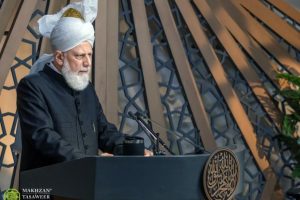
Maria Mina Mensah BSc (Hons) MCMI, is a Design Manager in construction and is currently involved in managing a multi-million-pound development in the chic district of Marylebone, London. Born in Ghana, Maria moved to London with her family, aged 9. Her drive, intelligence and leadership qualities were manifested early in life when she was elected as Head Girl at secondary school. Maria’s love for both the Sciences and the Arts led to her specialist degree in Architectural Engineering and Design Management at Loughborough University. Her talent and excellence in these fields were soon apparent from her swift nominations for professional awards such as the ‘Women in Property Award’, ‘Graduate of the Year Award’ and ‘Best Young Woman in Construction’. Maria also serves as a Regional Head for the women’s branch of the dynamic PAAMA UK (Pan-African Ahmadiyya Muslim Association).
The Review of Religions’ Women’s Section Editor, Munavara Ghauri, had the pleasure to ask Maria about her life, faith and goals.
MG: Welcome to The Review of Religions magazine Maria and thank you for sacrificing your valuable time for us.
MM: It is an honour to be able to share my story, so thank you for having me.
MG: You grew up in Kumasi city, Ghana, up to the age of 9. Can you tell us a little about Kumasi and your life there?
MM: Both of my parents were abroad at the time so I grew up with my grandparents, aunts and uncle. As is common in Ghana, the extended family lived in the same household, so there was never a dull moment and I always had people to play and interact with. I went to an international school but transferred to an Ahmadi School a few months before leaving the country.
MG: Ghana is predominantly Christian. In the latest census (2010), 71% of Ghanaians identify as Christian. Did you feel any religious tension in your local community, being raised in a practising Ahmadi Muslim family?
MM: I didn’t experience any religious tensions growing up. I went to school with people of all faiths with no problems. The Ghanaian culture as I remember it was always centred around community and still is. Ghana has historically been a very religiously tolerant country, so much so, that although the majority of the population identify as Christians, Eid (a Muslim festival) is celebrated as a national bank holiday.

MG: How nice! When you moved to England in 2004, starting a primary school in South London must have felt like entering a different world! Can you recall how you felt? How were British schools different to those in Ghana?
MM: It was certainly a culture shock moving to London. It seemed like a different world altogether. I was taught English in primary school in Ghana so I didn’t have too much trouble understanding and communicating in English, although there was some adjustment to the different accent and colloquialisms. I soon discovered, however, that the curriculum for my age in Ghana was at least a year ahead of what the kids in the UK were studying.
MG: That is an interesting point, Maria.
MM: Yes. I joined primary school towards the end of year four when most of my peers had already formed their friendship groups, so I struggled to form any meaningful friendships with my classmates. But I was able to get along with everyone just fine as time went on.
In Ghana, all pupils in public school, male and female, were required to shave their hair and keep it short throughout their school years until they go to university. Therefore, when I joined primary school in the UK, I had my hair shaved. So, I had to deal with a lot of questions about whether I was a boy or girl and why I had such different mannerisms. Another main difference I noticed as well is that playtime seemed to be a little less vibrant in the UK as compared to Ghana.
One of the best discoveries for me was the school library and especially fictional books. It began my love for books and reading and was largely responsible for my growth in vocabulary and understanding of western culture.
MG: You then attended a secondary school for girls in Norwood, London. I was impressed when I learnt that you were elected as Head Girl there. It suggests that you have good interpersonal skills and natural leadership qualities. Would you agree?
MM: Yes, I would agree. I am a naturally easy-going person so I didn’t have too much trouble talking to and forming relationships with my peers in secondary school. It meant that I could communicate with different types of people with different interests and agendas. This was important to the role of Head Girl, in being able to represent the interests of my cohort. I believe this formed a large part of me getting the role.
MG: You decided to study Architectural Engineering and Design Management at Loughborough University. It seems a very niche field. Can you tell us how your interest in these disciplines developed?
MM: I can only say that it was by Allah’s design because it was not my intention to study this subject. Things just seemed to work out that way. My favourite subject at GCSE was Chemistry, I had a teacher who was incredibly passionate about the subject and that passion really rubbed off on me. Going into my A-levels, I thought I wanted to become a Chemical Engineer because that seemed to be the only viable career or degree at the time. My A-level subjects, therefore, included Chemistry. I soon discovered it was a completely different beast at A-level than it was at GCSE. I, therefore, decided to change paths and dropped Chemistry at AS Level.
My other subjects at the time were Physics, Maths and English Literature. With these subjects and with my affinity for both sciences and art, I decided that Architecture would be the sensible path to take. I, therefore, picked up Art as an additional A-level in order to build a portfolio, which is a requirement of most Architecture degrees. I applied for Architecture for 4 of my university choices but came across the Architectural Engineering and Design Management degree by chance. I decided to look into it because it offered a much broader insight into the industry; it appealed to my strengths and offered the opportunity to get on to the managerial ladder straight away following graduation.
MG: Picking up Art as a fourth A-level was impressive Maria as the impression I get from Art students is that it is a very time-consuming subject albeit enjoyable. Can you explain what the core subjects of your BSc degree were?
MM: My degree was aptly named as it summarised the core subjects that were covered. The purpose of my degree was to produce Design Managers. The role of a Design Manager is to manage the design portion of the building process from conception through to construction, ensuring that the information from all disciplines including architectural, structural, mechanical and electrical engineering design, are fully coordinated and delivered in a way that in line with British standards and regulations, as well as meeting the client’s requirements.
In order to prepare students for this role, the modules provided as part of the degree were chosen to give the students an insight and understanding into the role of the many disciplines within the construction industry that we would have to manage or consult with when working in the industry. The modules covered architecture, including architectural history, theory, hand-drawing, 2D and 3D design.
MG: It sounds like a fascinating fusion of many different fields, both scientific and creative, that would offer great variety and technical challenges.
You began to wear the hijab (the veil) at university. You have also told me that you enjoyed making friends with students from diverse backgrounds. How did you maintain your Islamic values whilst also enjoying the social side of university?
MM: At University, I had the room to grow based on the Islamic principles I wanted to live by but had found difficult to adopt earlier. I also saw University as a test run to the ‘adult’ world and I am glad that I made the decision to go with it. Wearing the hijab was a constant reminder that I am an Ahmadi Muslim and therefore needed to behave like it. It helped me a lot to navigate the university social life and have fun while sticking to my principles.
MG: After the first year of your degree, you achieved first position in your cohort and then were nominated for the ‘Women in Property Award’, where you reached the finals. You were also nominated for the ‘Graduate of the Year Award’, where once again you were a finalist. Then last year, you were nominated as the ‘Best Young Woman in Construction’ at the young age of 25. These are impressive accolades. What would you say was the secret to your success?
MM: God Almighty first and foremost, because I could not have achieved any of this without His grace. My mum has always been an inspiration to me. She has always urged me to give my best to every venture in my life and seek Allah’s help in the face of challenges.
I have always tried to take advantage of every opportunity that comes my way. This has served me very well in opening my eyes to the various paths that are open to me, rather than closing myself off. Getting involved in activities taking place in the company helped to broaden my knowledge as well as widening my network, which I have then been able to use for the benefit of my projects and my career. It also helped me to increase my visibility within my organisation and the wider industry.
In summary, I would say it comes down to taking advantage of all opportunities, getting involved and providing value to those around you, no matter where you are.
MG: After the second year of your degree, you worked in industry. You worked for Kier Group, a leading UK construction company. There, you realised that the construction world is dominated by a white, male workforce. How did you navigate training (and then working) in such an environment? Have you ever felt that your hijab has hindered your professional development?
MM: Growing up in South London, I was constantly surrounded by people of a wide variety of ethnicities and cultural backgrounds, so I was never really keenly aware that there were spaces in which I would stick out like a sore thumb, for lack of a better expression. My university was the first taste of that, followed by my introduction to the construction industry. However, I treated it like any other opportunity, by keeping an open mind, open ears and a keen willingness to learn.
I think I may have a slightly different perspective to others when it comes to being an ethnic minority in the workplace, in the sense that I see it as an advantage. Standing out automatically gives me a higher visibility in the workplace, I am easily recognisable by face and name. Coupled with my hard work, in my experience, this has enabled opportunities to come my way, that I believe may not have otherwise.
I do, however, feel a responsibility and pressure to always be on my game and perform to the highest standard. In a sense, I am almost seen as a representation of black Muslim women, as a lot of my colleagues have very limited experience working with someone like me. I do my best to take opportunities to educate my colleagues about my religion, culture and perspective where I can. I can only pray that I am doing my small bit to move us all forward.
I make a conscious effort to put myself out there so that others like me know that it is possible for them to be and thrive in this space.
MG: I see. What is the current project you are working on, Maria?

MM: My current project called ‘Marylebone Square’ is a £106M mixed-use project with 5 levels of luxury apartments, two-level retail spaces and underground car parks. The land is unique for being a piece of land in Central London that has remained unclaimed for the past five decades which is unheard of. The project has many technical challenges including a complex triple basement construction, intricate construction details and complex structural elements.

MG: That sounds like it has the potential to be a magnificent, state-of-the-art development! It reminds me that the creative potential of humans is something we believe to be bestowed by Allah Almighty in Islam. He is the Ultimate Fashioner (Al Musawwir) and anything we achieve, any faculties we have, are through His Grace. Allah Almighty reminds us of this in Chapter 40 of the Holy Qur’an when He declares:
‘Allah is He who has made for you the earth a resting-place, and the heaven a structure for protection, and has given you shapes and made your shapes perfect,’ [1]
You have been involved in the refurbishment of schools and residential and commercial developments on a large scale. Do you have a dream project or do you already feel you have reached the apex in terms of your career?
MM: I am just getting started in my career. I have certainly had the opportunity to work on some amazing projects so far, but there is still so much more to learn and experience. Ideally, I would love to have experience in a wider variety of sectors, especially healthcare, higher education and complex commercial projects. I am also working on growing and honing my managerial and leadership skills. So, in short, I have definitely not reached the apex!
MG: How important is your faith to you?
MM: My faith is an extremely important part of my life. My beliefs as an Ahmadi Muslim and the Islamic teachings that I have been raised with have formed the principles by which I navigate the world and interact with those around me. Prayer is a huge part of my success as I know that I can put in the hard work but ultimately, God Almighty is in control. Praying for His guidance and having faith in His plans is what has gotten me through several setbacks throughout my life. It is the trust in God that has given me the freedom to be able to make the most of every opportunity that has come into my path as I have believed most of them to be in answer to my prayers.
MG: You are a member of the PAAMA (Pan-African Ahmadiyya Muslim Association) UK and the Regional Head of the ladies’ branch of this organisation. Can you tell us a little about it?
MM: The Pan-African Ahmadiyya Muslim Association UK is a subsidiary Association within the Ahmadiyya Muslim Community UK. It is a unique, dynamic and vibrant Association, serving not only the needs of its members but British society as a whole and the continent of Africa at large.
The Association is comprised of all Ahmadi Muslims of African origin living in the UK. With its own National Executive and Regional Heads as well as a parallel National and Regional administrative structure for female members, the Association has at its organisational apex a National President. We organise many activities geared at maintaining and increasing the knowledge of our members in both spiritual and secular arenas. Meanwhile, we provide social settings for members to bond in and discuss their shared experiences.
MG: Do you have any advice for other young women who may be considering a career in Architectural Engineering or Design Management?
MM: By pursuing a career in this industry, you are walking through doors that lead to countless opportunities. There are so many different roles available in the industry and there is a huge drive to recruit more young women into it. There has never been a better time to enter and thrive in the industry.
Success belongs to those with drive, focus and commitment, and does not need to be limited by the current landscape of the industry. I hope other young women will take my story as an example that anyone with determination can make it.
MG: Thank you for sharing your story and professional insights with us, Maria. We wish you the best of luck and I look forward to hearing of your future developments!
ENDNOTES
[1] The Holy Qur’an 40:65




Add Comment